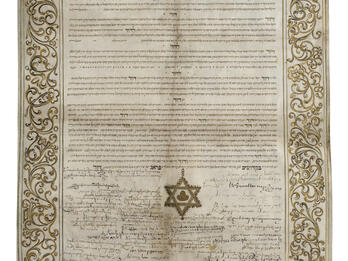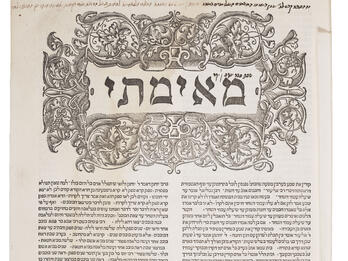Spinoza and the Heterodox Challenge
Baruch Spinoza is notable for rejecting Judaism without converting to Christianity. After his excommunication from Amsterdam's Sephardic community, he developed the basis of modern biblical criticism.
Some early modern Jews went so far as to leave the Jewish community entirely, but it is difficult to find another Jew in this period who withdrew in precisely the way Baruch Spinoza (1632–1677) did, by abandoning Judaism completely without converting to another religion. Of course, during this period, numerous Jews cut themselves off from the Jewish people and religion. But all these actions involved conversion. The case of Spinoza is paradigmatic of the attitude of Jews in modern times, who distanced themselves ideologically and socially from the Jewish people and from Judaism but without ever converting to Christianity or Islam.
After being excommunicated by the Sephardic community of Amsterdam in 1656, Spinoza spent the last twenty years of his life without any connection with his native community or with the religious life of Judaism at all. Unlike some who uttered heresies or were accused of heretical writing, Spinoza never retracted his statements or showed any signs of remorse. On the contrary, his 1670 Tractatus Theologico-Politicus (Theological-Political Treatise), which laid the groundwork for modern biblical criticism, contains the sharpest possible expression of his alienation from Judaism and a penetrating criticism of the “Religion of the Hebrews.” Spinoza relates to the Jewish religion in this book out of an absolute emotional distance, as if he were an anthropologist writing about an exotic tribe, and without betraying any connection or emotional closeness to his former community. In the third chapter, where he refutes the idea of the chosenness of the Jewish people, he concludes unequivocally, “In intellect and true virtue no Nation is distinguished from any other; so in these matters God has not chosen one in preference to others.”1
Unlike other Jewish intellectuals who left Judaism, Spinoza did not relocate to another place. He spent virtually all his life in a single province: Holland, in the heart of the Dutch Republic, seldom leaving it. In 1661, he moved out of Amsterdam, where he was born, to Rijnsburg, a town near Leiden, and after a few years he moved from there to Voorburg, a small town near The Hague, where he spent the last five years of his life. He went to Leiden to hear lectures at the university, and in 1673, when the French army invaded the Dutch Republic and occupied large areas of it, he crossed the lines—a rather daring and adventurous act—and visited the French headquarters, having been invited by the Prince of Condé, commander of the invading French army. Although he never met the prince, his action aroused astonishment and consternation among quite a few Dutchmen.
Notes
Edwin Curley, ed. and trans., The Collected Works of Spinoza (Princeton, N.J.: Princeton University Press, 2016), 2:125.



